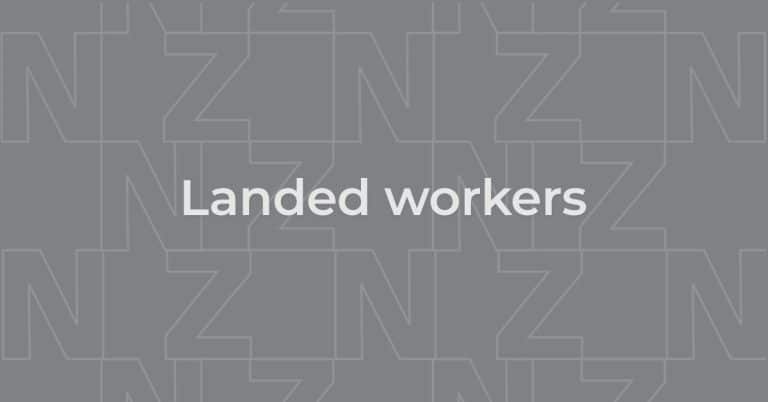AEWV 2022 – Overview of the new Accredited Employer Work Visa
Contents
- Become an accredited employer and hire skilled migrants in New Zealand
AEWV and mandatory employer accreditation commences on 4 July 2022
- The AEWV work visa can help set migrants on the pathway to New Zealand residence by allowing them to work in New Zealand
- There are three steps to hiring a migrant employee on the new AEWV
- Employers can submit completed applications to Immigration New Zealand for accreditation from 23 May 2022
- Immigration New Zealand will assess your company’s history of employment practices by inspecting
- Do we need HR policies?
- Other essential documents you must have include
Become an accredited employer and hire skilled migrants in New Zealand
AEWV and mandatory employer accreditation commences on 4 July 2022
Where genuine skill or labour shortages exist, accredited employers can hire skilled migrant workers using the new AEWV which is a new temporary visa that replaces six previous work visas with a streamlined single visa process.
Companies must be accredited under the new policy to employ migrants on the new AEWV including companies that were accredited under the previous system, who must reapply for accreditation and meet the requirements to continue employing migrants on work visas moving forward.
The AEWV work visa can help set migrants on the pathway to New Zealand residence by allowing them to work in New Zealand
This has the potential to provide employers who are accredited with an advantage over employers who are not accredited in terms of being able to source and hire skilled migrants.
There are three steps to hiring a migrant employee on the new AEWV:
- employer accreditation;
- the job check; and
- the migrant check.
Employers can submit completed applications to Immigration New Zealand for accreditation from 23 May 2022
When approved, employer accreditation is initially for a period of 12 months, and at renewal most employers will get accreditation for 24 months.
The overall purpose of Employer Accreditation is to provide evidence of your positive and proactive HR practices, and your business position, to ensure workers in New Zealand on work visas will have continuity of work in a positive environment.
For Immigration New Zealand to approve your company as an Accredited Employer so that you can hire migrant employees on the new AEWV you will need to be able to provide evidence that your company has good human resources practices. This includes ensuring your company has:
- good workplace policies in place (and are actually working in practice);
- good procedures e.g., how to report an accident or incident (and they are followed);
- legally compliant employment agreements; and
- quality health and safety policies and procedures (and they are complied with).
Your application for accredited employer status includes a requirement for you to declare that:
- You and your significant office holders are not on the Labour Inspectorate stand-down list.
- You and your significant office holders e.g., directors and owners have not recently been convicted of specific immigration-related offences resulting in a fine or imprisonment. If you have, you will not be eligible for accreditation for a set period of time. The length of the stand-down period will depend on how serious the offence is. Once the stand-down period has ended, you must show you have addressed the non-compliance and taken steps to make sure it does not happen again.
- You or your significant office holders e.g., directors and owners have not employed a migrant who does not have the right visa or visa conditions to work in that role, you have not employed a migrant in a role or under conditions that do not match those provided in their employer-supported visa application or provided false or misleading information to INZ. If you or your office holders have, you must show you have addressed these issues and taken steps to make sure it does not happen again.
- Your business has not been re-established under a new legal entity and NZBN while remaining essentially the same as another business failing to meet the accreditation requirements.
Your significant office holders are not banned from acting as a director or have a pattern of immigration offences in other businesses they have been involved in. Where offences have occurred, you must show you have taken steps to prevent it happening in the business applying for accreditation.
Immigration New Zealand will assess your company’s history of employment practices by inspecting:
- WorkSafe or Labour Inspectorate findings;
- Redundancies that have occurred in the past 12 months;
- Union representative feedback (if you have union members); and
- ISO certification (if applicable).
Immigration NZ will contact the employer if background checks show the employer does not meet the requirements.
Do we need HR policies?
HR policies set clear and consistent expectations for employees across the whole business. They help to prevent misunderstandings and employees having to guess what is expected of them. They guide the business overall and help managers to make fair decisions.
HR policies need to be easily accessible to all employees, they are frequently referred to and used by everyone in the business.
It is common for smaller or newer companies to start off without policies (employment agreements also), either because they don’t have the time or expertise to create them, or they view them as restrictive or an imposition on the freedom of the owners to manage their business. As an example, many managers want the freedom to reward a good employee with additional leave or grant them a pay rise, and at the same time, giving a ‘not-so-good employee’ fewer benefits and freedoms. This kind of ‘managerial discretion’ to do as one wishes is actually highly risky for the business as the inconsistency and unfairness it creates is a personal grievance waiting to happen.
HR policies and procedures are an important and valuable tool to help you manage your employees. They work alongside employment agreements to make sure both parties are clear on the expectations and obligations of the employment relationship.
Correct, compliant HR policies & processes can:
- reduce the risk that anyone misunderstands the conditions of employment;
- ensure fairness;
- give you a good reference point to confirm that you’re complying with all relevant legislation; and
- help you get consistency across multiple locations.
ConsultingHQ has an extensive database of reliable workplace HR policies that have been extensively utilised by our clients. These are available as templates for a client’s own use. We ensure our templates are kept up to date with changes in employment legislation and are guaranteed to be compliant and fit-for-purpose.
A list of the kinds of workplace policies you should consider, although not all of them will be relevant to your business, include the following:
- code of conduct — this should also cover privacy and conflicts of interest
- discipline, misconduct and employment investigations
- health and safety
- harassment and bullying
- alcohol and drugs
- holidays and leave (including parental leave, domestic violence)
- hours of work and overtime, including time in lieu and flexible work arrangements
- information security
- workplace surveillance
- internet, e-mail and social media use
- leaving the business
- performance appraisals
- recruitment, including reference checking
- resolving employment issues and grievances
- flexible working arrangements
- training and development
- travel
- company vehicles
- personal presentation and dress standards
- use of company equipment
- how to manage customer complaints
- gifts and celebrations
- annual close downs
Other essential documents you must have include:
- employment agreement templates (up to date and legally compliant covering permanent full time, part time and casual employment situations)
- job descriptions
For further information on HR policies and related requirements for accreditation so that you can start preparing your company’s accredited employer application, contact one of our experienced HR team members on and we will help you to get it underway.
Contact us to find out how we can help your business.
Latest posts by Tanya Gray (see all)
- The hungry, humble, smart methodology in recruitment: A key to business success - April 2, 2024
- March landed workers - March 31, 2024
- Ensuring quality hires: The importance of comprehensive reference checks in recruitment - March 22, 2024







